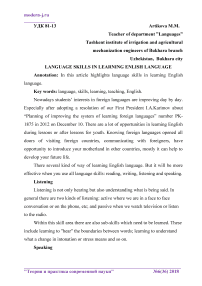Language skills in learning English language
Автор: Artikova M.M.
Журнал: Теория и практика современной науки @modern-j
Рубрика: Основной раздел
Статья в выпуске: 6 (36), 2018 года.
Бесплатный доступ
In this article highlights language skills in learning English language.
Language, skills, learning, teaching, english
Короткий адрес: https://sciup.org/140273504
IDR: 140273504
Текст научной статьи Language skills in learning English language
Nowadays students’ interests in foreign languages are improving day by day. Especially after adopting a resolution of our First President I.A.Karimov about “Planning of improving the system of learning foreign languages” number PK-1875 in 2012 on December 10. There are a lot of opportunities in learning English during lessons or after lessons for youth. Knowing foreign languages opened all doors of visiting foreign countries, communicating with foreigners, have opportunity to introduce your motherland in other countries, mostly it can help to develop your future life.
There several kind of way of learning English language. But it will be more effective when you use all language skills: reading, writing, listening and speaking.
Listening
Listening is not only hearing but also understanding what is being said. In general there are two kinds of listening: active where we are in a face to face conversation or on the phone, etc; and passive when we watch television or listen to the radio.
Within this skill area there are also sub-skills which need to be learned. These include learning to "hear" the boundaries between words; learning to understand what a change in intonation or stress means and so on.
Speaking
As with listening, speaking can be active or passive. Active speaking is when we speak on the phone or face to face and there is interaction between the speaker and listener. Passive speaking is when we speak with no interruptions or feedback from others e.g. giving a speech or a teacher droning on and on and on!
Sub-skills here include pronunciation as well as using stress and intonation in the correct way. There are also more semantic skills such as how to choose the correct word and building an argument, etc.
Reading
Reading is well developed in most societies. Sub-skills here include deciphering the script (e.g. the Roman alphabet or Cyrillic or Chinese characters), recognizing vocabulary and picking out key words in the text. Here a knowledge of syntax comes into play and also the ability to transfer what is written into real-life knowledge.
There are also important reading sub-skills such as skimming, reading for gist, reading for detail and so on. These all have to be taught to students.
Writing
Sub-skills here include spelling and punctuation, using the correct vocabulary and of course using the correct style whether that be formal, poetic or whatever the occasion demands, from a shopping list to wedding vows.
These days as well there is not only the physical ability to use a pen and write but also the use of a keyboard or keypad.
So you were given the explanation of the language skills. The following advices are how to improve your language skills:
Reading is very important to all of us. It builds our knowledge, it gives us an escape, and it exercises our brains. The more you read, the better your reading skills and pronunciation will improve. Read on topics you're interested in, be it a romance novel, a sports magazine, newspaper or a car engine manual.
Try your hand at writing a novel, a short story, a poem, a play, or any other kind of creative writing. If you work at it bit by bit each day, it will hone your writing skills as well as exercise your creativity.
While you're listening, write down good notes and important details he/she says. Block distracting things from your mind. Listen to other people speaking the same language to improve your speaking and writing and pronunciation.
Take a topic and explain it. And a be sure to talk loud enough so people can hear and speak with little words and big words mixed together. Discuss the topic of your speech with others. Communicate a lot.
Select the details from the text read in Part 1 and have written down in Part 2. Explain the details out loud. Make reference to the text to support your inferences, points of view and opinions.
Explore the language features and their effects. When speaking, use figurative language to clarify your points, for example: similes, personification, metaphor, etc. Use short sentences to make the points clearer. Identify and explain the author's purpose. Discuss this with others if possible.
-
• Analyze the author's range of vocabulary. How does the author convey messages, moods, attitudes and feelings?1
In conclusion I want to say that, as you see all types of language is necessary in learning English language. Listening more develop your speaking skill, reading more develop your writing and speaking skills. Because when you listen something, you can speak it, when you read something, you can write and speak it. While reading some topic you come across with unknown words, you will learn writing style of the author and using grammar rules. It of course can help develop your writing skills.
If you want to learn foreign languages try to making use of all language skills during your classes or you can use it independently at home.
Список литературы Language skills in learning English language
- Ўзбекистон Республикаси Президентининг Қарори "Чет тилларни ўрганиш тизимини янада такомиллаштириш чора-тадбирлари" тўғрисидаги 2012 йил 10 декабрь, ПҚ-1875-сон («Халқ сўзи» газетаси, 11.12.2012 й., 240 (5660)-сон)
- http://www.proz.com/translation-articles/articles/87/1/How-to-improve-the-ability-of-listening,-speaking,-reading-and-writing
- http://www.wikihow.com/Improve-Your-Language-Skills-Through-Reading,-Writing,-Listening-and-Speaking
- www.onestopenglish.com/skills


